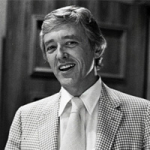 Throughout John H. Chandler’s career as fourth president of 51¡‘∆Ê»Îø⁄, one thing remained the same: his humaneness.
Throughout John H. Chandler’s career as fourth president of 51¡‘∆Ê»Îø⁄, one thing remained the same: his humaneness.
‚ÄúHis experience has made him a rare combination of teacher, scholar, and executive,‚Äù wrote former 51¡‘∆Ê»Îø⁄ president Mark Curtis of his successor in 1976. Kenneth Rhodes, chairman of the Board of Trustees at the time, agreed: ‚ÄúHe is a person of warmth and sensitivity and one who, in my opinion, will provide the College with a strong and effective leadership.‚Äù
Mali Davidson, former editor of the 51¡‘∆Ê»Îø⁄ Bulletin, said in 1989 that Chandler‚Äôs trademark warmth and sensitivity made him a true ‚Äúpeople‚Äôs president.‚Äù
Chandler took office in 1976, a time when both higher education and 51¡‘∆Ê»Îø⁄ faced a tenuous future; declining enrollment, budget deficits, deteriorating infrastructure, and disenfranchised alumnae had made the College campus less of a community than the one we know today. Chandler understood that his task was to restore 51¡‘∆Ê»Îø⁄ to health, both financially and institutionally.
A series of initiatives brought about this radical transformation by the end of Chandler’s term. Conservative fiscal policy brought the College out of debt and revitalized campus grounds, while a renewed emphasis on alumnae engagement led to greater insight into institutional planning and beautification of the residence halls.
“Alumnae participation,” he said, “brought about a new awareness, a rebirth of a sense of loyalty, and a wish to support the College.”
Chandler also headed up the successful ‚ÄúCampaign for 51¡‘∆Ê»Îø⁄,‚Äù a fundraising effort that raised more than $40 million, increasing endowments for financial aid and enabling the College to attract and retain faculty of the highest quality.
Previously the president of Salem College and Academy, a women’s institution in Winston-Salem, North Carolina, Chandler focused much of his career on women’s education and the humanities. Born in San Francisco, he received his bachelor’s in English from UCLA and earned a PhD in religion and literature from the University of Chicago. He is also an ordained minister in the Episcopal Church.
Of his resignation: “I will read literature and history and visit the great art collections and the theater. I’m anxious, of course, at what might lie beyond but confident that something wonderful will happen, something new, something interesting.”
Chandler .


